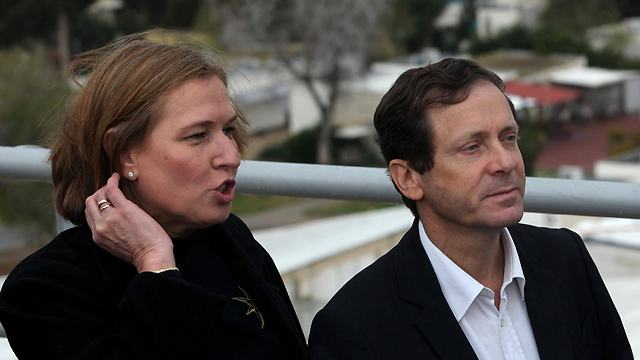
Netanyahu's political persuasion
Analysis: From the start of the election campaign and even beyond his victory, Netanyahu has had one message - a unity government is not on the agenda. But can this declaration withstand a reality check?
If one were to go back through the history of Israeli politics, one would be hard pressed to find a more militant campaign that was more strongly against the establishment of a unity government as in the elections of 2015. And the leader, strategist, formulator and thinker of this campaign was none other than the prime minister and leader of the ruling party, Benjamin Netanyahu.
It began about a month and a half before going to the polls, and lasted well into Election Day with explicit statements, almost unprecedented political narrative between two parties. This was no slip of the tongue or idle saying, but the truth.
If Netanyahu had any one commitment, it was to make a clear promise: "I will not set up a unity government with Tzipi (Livni) and Buji (Isaac Herzog). It will not happen."
Netanyahu disseminated his message via written and electronic communication, the Internet, social networks, Facebook and Twitter.
The first declaration came on Netanyahu's Twitter account on February 8. "The left-wing parties, primarily the Zionist Union, will stay out of the next government - if I am chosen to establish it," Netanyahu tweeted. "I will not form a government with left-wing parties, in view of the deep ideological gulf now existing between Likud and Buji and Tzipi."
On February 24, Netanyahu published a detailed post against as unity government on his Facebook account. "There will not be a unity government between me and Tzipi and Buji," he reiterated. "It will not happen, because of the deep ideological chasm between us."
He warned that Herzog and Livni would bring Islamic State to the outskirts of Jerusalem and said the Palestinian territories would be handed over to Hamas to use as terrorist bases. "I am in favor of a united Jerusalem under Israeli sovereignty, they are against it," Netanyahu went on.
"I am against giving up the West Bank, because the whole area will become a terrorist base for radical Islam, and they are in favor. I stand firm against international pressure regarding Israel's security interests, and they are only willing to give up, give in, retreat, surrender."
Netanyahu promised that, "there will be no unity government. I want to build a broad national government, which will continue to stand firm and strong, with our natural partners, led by Bayit Yehudi. A government that will continue to stand firm on Israel's security interests against all our enemies, which will continue to grow Israel's economy, which will continue to lead - with courage and responsibility - the State of Israel. Therefore the upcoming election is a choice between a Likud government under my leadership, and the left-wing government headed by Tzipi and Buji. This is the choice, there is no other choice."
'Share this now'
Some of the Likud campaign was born as a response to the attacks from Bayit Yehudi chairman Naftali Bennett, who claimed that Netanyahu was plotting to set up a unity government after the elections - and keep his party out.
Bennett argued that Netanyahu was eyeing a unity government, and Netanyahu in response stepped up his rejection of a unity government, and appeared to be giving the nod to the ultra-Orthodox and the settlers.
"I will not sit in a unity government and will not form such a government after the elections," Netanyahu said in an interview to Orthodox news outlet Makor Rishon on March 11. "I do not intend to sit in a government headed by Yitzhak Herzog."
As the date of the elections approached, the anti-unity campaign became an irrevocable commitment. Five days before the elections, Netanyahu wrote on Twitter: "I will not set up a unity government, there will be no rotation government. Those who want me as prime minister must only vote for Likud."
On the same day, Netanyahu also published a personally signed piece on the Kipa Orthodox website, in which he wrote: "We are now facing a major global effort to oust the right-wing and Likud from power and replace me with Buji and Tzipi.
"We cannot allow a left-wing government led by Buji and Tzipi. This would be a government of concessions and withdrawal. A government of submission to external dictates and damage to settlement. Bayit Yehudi is our natural partner, and it will sit with us in any coalition. Nonetheless, there is a gaping chasm between us and the Labor Party. We will not sit with them any unity government. Period."
On March 13, Netanyahu told the media that he did not believe in the establishment of a national unity government: "A unity government with Tzipi and Buji would not last for even one minute."
The height of the campaign against a unity government came hours before the polls opened. On March 16, at 23:29 – 30 minutes before Election Day officially got underway - Netanyahu announced the strongest post on the subject, urging his supporters to spread his message online.
"There will be no a unity government. Share this now," was the headline on the late-night post. "This is a trick to widen the gap between Labor and Likud.
"This is what is happening right now. If the gap is not closed, the 'Labor' Party will be able to set up a left-wing government with the support of the Arabs. There is only one way to avoid this - vote Likud and close the gap.
"There will be no a unity government. If the Likud forms the government, it will be a national government. Talk of a unity government is media spin designed to reduce the number of Likud seats and produce a victory for the left. Every vote that does not go to the Likud increases the chances of the 'Labor' party setting up a leftist government with the support of the Arabs. And therefore, to establish a national government – vote Likud."
And Netanyahu did not let up. On the afternoon of March 17, in the throes of voting, he again denied in an interview the possibility of a unity government.
"If the formation of the next government falls on me – I will set up a government from the national camp," he pledged.
"A leftist government would be reliant on the Arab List and would give in every step of the way. There will be no unity government with Labor, there is no way to bridge the gaps between us."
But it was hard to find senior Likud ministers to parrot Netanyahu's mantra during the campaign. Perhaps because its DNA is so completely different to that of previous political discourse between Likud and Labor.
In fact, some Likud ministers are clinging even today to their support for a national unity government, ministers as Silvan Shalom, Moshe Ya'alon and Yuval Steinitz. One of the few who stood behind Netanyahu anti-unity campaign is Israel Katz, who a few days before the elections told the media: "We will not enter a unity government under any circumstances."
Netanyahu's behavior in the recent election was completely different from the way he worked in the two previous elections of 2009 and 2013. At that point, he was still an advocate of the unity government, and advocated its establishment with the exact same partner - Labor.

Shortly before the 2009 elections, Netanyahu visited the office of then-defense minister and Labor leader Ehud Barak in Tel Aviv, for a one-on-one meeting to discuss Labor joining a unity government headed by Netanyahu. Barak received Netanyahu's pledge that he would once again be defense minister, and, despite a pledge after his electoral defeat that "we will serve the people from the opposition", Barak decided to join the Netanyahu government.
After the 2013 elections, Netanyahu held secret negotiations with Shelly Yacimovich, then chairman of the Labor Party. Netanyahu offered her a significant package of portfolios in an effort to persuade Labor to join a unity government, but Yacimovich rejected every one of his advances. Finally, he turned to the Hatnua chief Tzipi Livni, who became the first to sign a coalition agreement with Likud.
'It's all spin'
Netanyahu kept up his constant attacks on the very notion of a unity government even after the election was over. On March 22, he said that no unity government would be formed with the Zionist Union, while his spokesman claimed that, contrary to media reports, there had been no Likud overtures towards Isaac Herzog. "If Netanyahu wants to contact him, he would do it himself," the spokesman said.
And Herzog? During the election campaign, the Zionist Union leader was careful not to commit to or strongly oppose a unity government. His refusal to make a formal and explicit promise one way or the other sparked a wave of rumors in the political system and in his party itself. Senior Zionist Union members even claimed that, "Herzog will not close the door on the possibility of forming a unity or rotation government."
After the elections, the Zionist Union leader declared his party would serve the people from the ranks of the opposition: "This is the only realistic option - we will be a worthy substitute to this government with a limited lifespan."
Another week passed, and Herzog posted the same pledge on his Facebook page. "If anyone wants to know the intentions of me and our party is welcome to ask and hear to what I say. We will be an aggressive opposition. The rest is spin. I am saying clearly: The Zionist Union party is not a tool in the race to demolish the State of Israel that Bennett and Bibi are running."
This week Israel's Channel 1 television reported a secret meeting between Netanyahu and Herzog. They both denied it. I spoke with Herzog last week, and he again denied the report. If this is the case, shall the twain ever meet?











